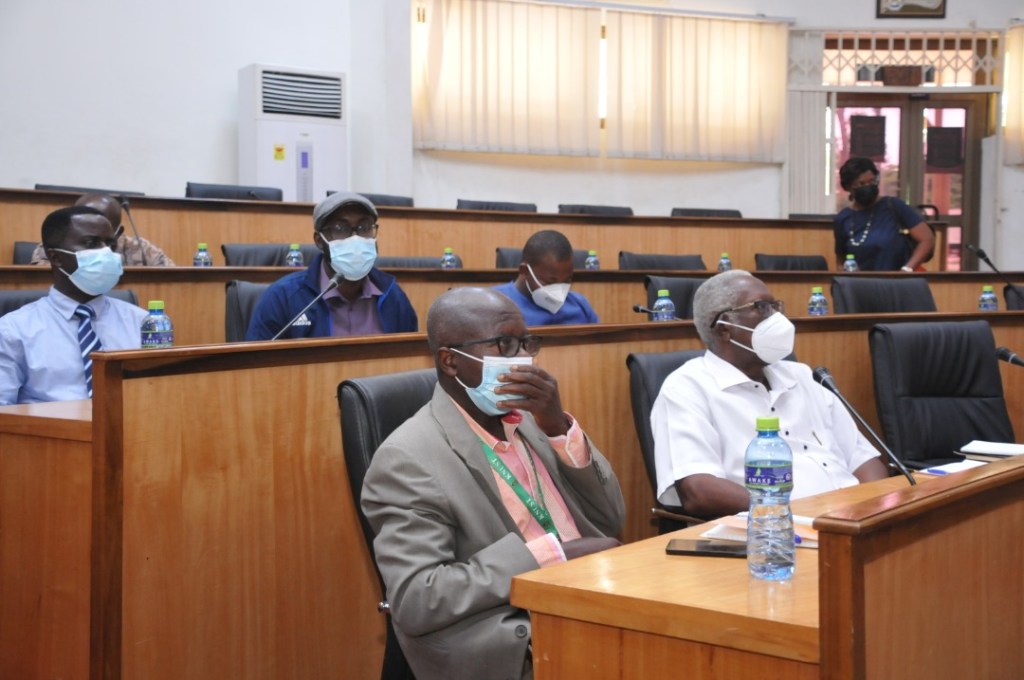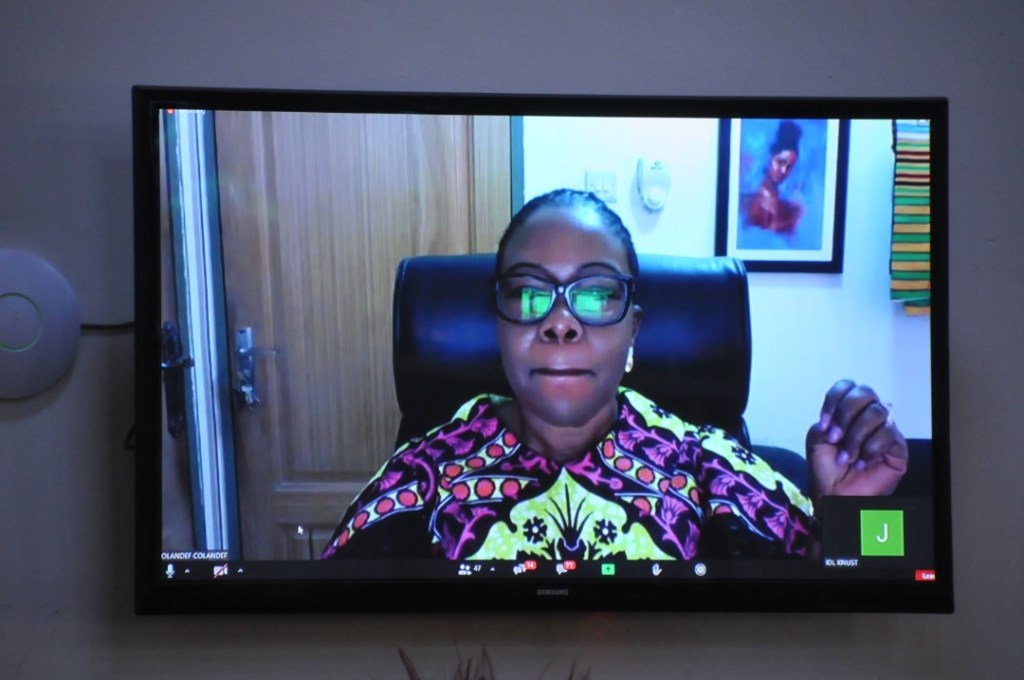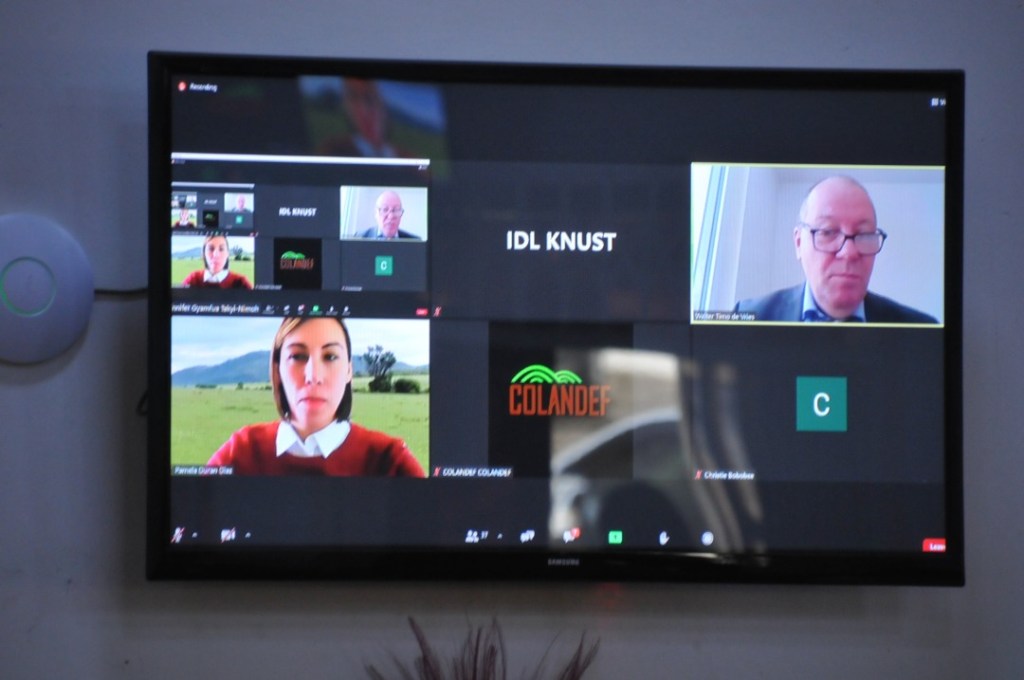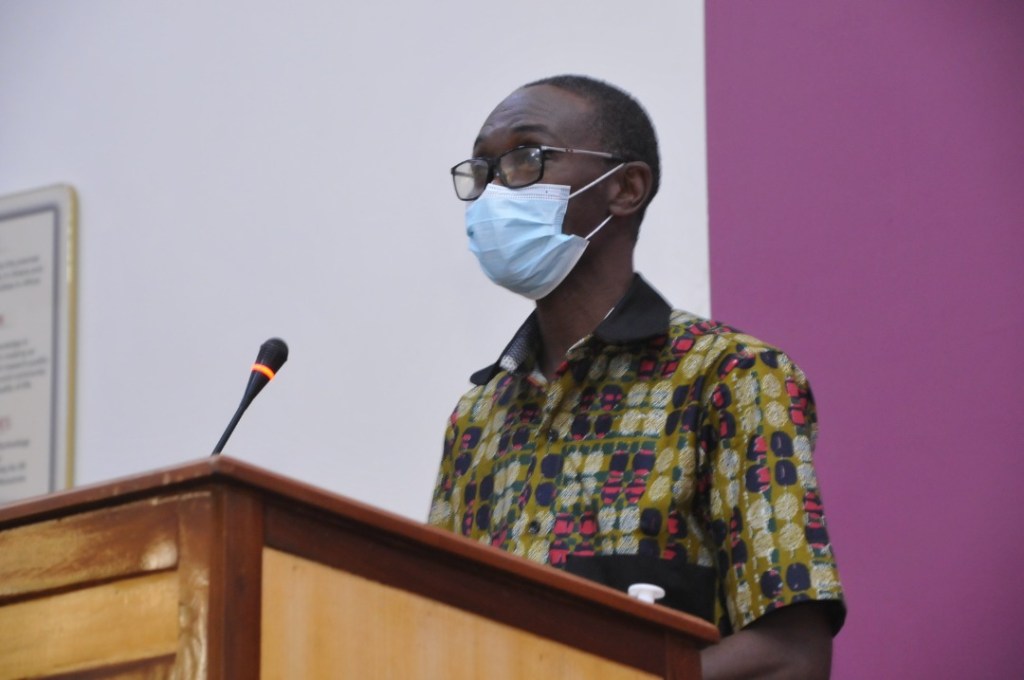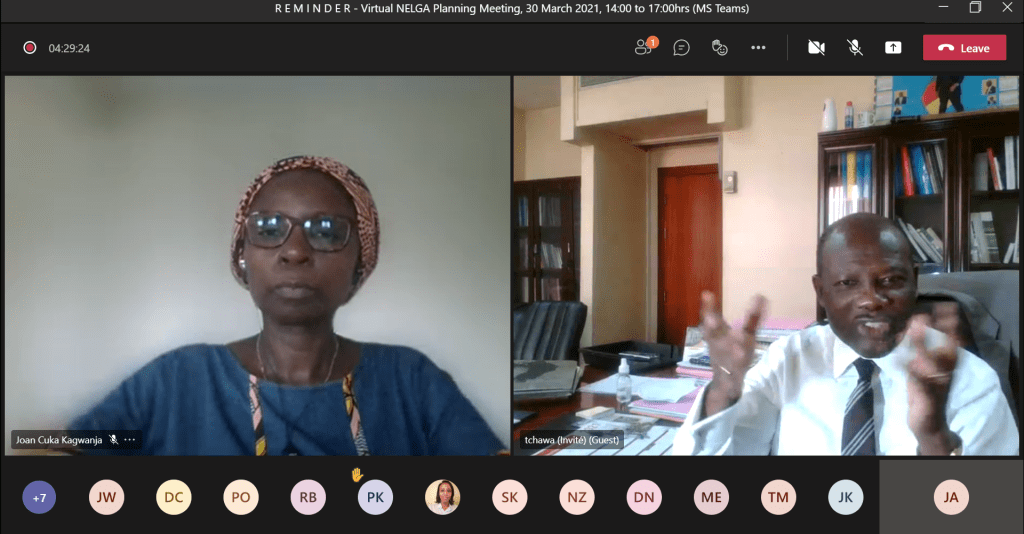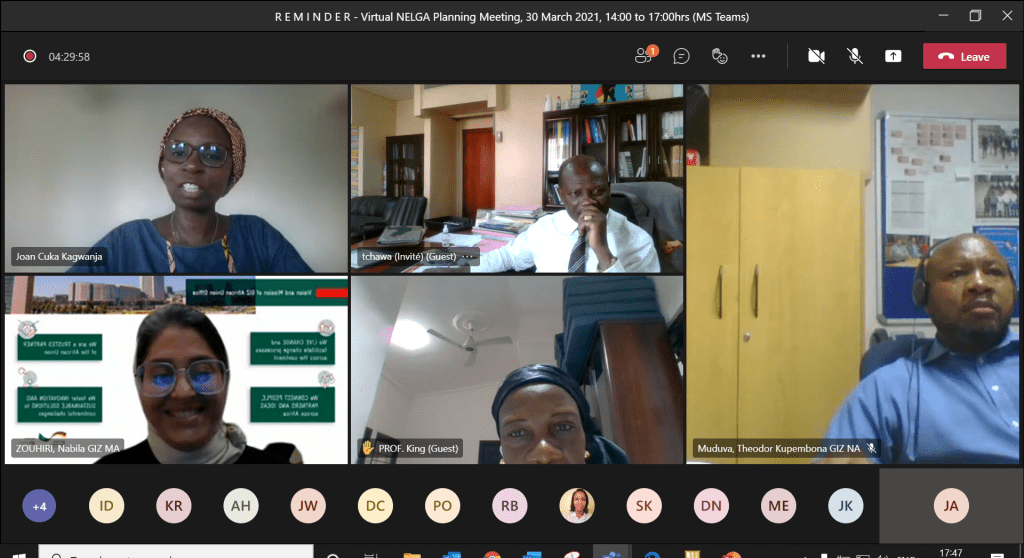Category: Uncategorized
ALPC, JKUAT Launch Land Governance Curriculum Review Process in Kenya
It is essential to ensure that the curricula for the Land Resource Planning and Management Programme provides a basis for training professionals who can positively influence the land governance policy space in Kenya and indeed Africa– Dr Joan Kagwanja
Online, May 20, 2021: The AU -UNECA- AfDB African Land Policy Center (ALPC) collaborated with Jomo Kenyatta University of Agriculture and Technology (JKUAT) in an inception workshop for the curriculum review and development of the Land Resource Planning and Management Programme (LRPMP). The inception workshop was aimed at building consensus on the methodology and roadmap for reviewing the LRPMP curriculum, applying the African Union (AU) endorsed Guidelines for Curricula Development on Land Governance in Africa.
UNECA’s Director of Private Sector Development and Finance Division, Mr. William Lugemwa, commended the initiative saying, “Governance of land tenure is a fundamental component for achieving inclusive and sustainable development in Africa, and the initiative by ALPC and JKUAT to strengthen human and institutional capacities will greatly enhance the implementation of the AU Land Agenda.” He lauded the stakeholders for coming together to address the gaps in the Land Resource Planning and Management bachelors program using the AU endorsed tools such as the Guidelines for the Development of Curricula on Land Governance in Africa. “As ECA, we are especially encouraged by the great efforts the University has made to make this review a reality despite restrictions brought about by COVID-19.” He further indicated that ECA, AUC and AfDB in the auspices of ALPC, are committed to this partnership and hope to walk with the university towards a successful Land Resource Planning and Management Programme.
In his welcome remarks, JKUAT Deputy Vice-Chancellor, represented by Prof. Okong’o, also noted that the workshop was timely, observing that the review process is well-aligned with the related needs identified by the institution in meeting the land governance industry needs. “ JKUAT hosts almost 385 programmes which are carefully developed to address developmental challenges. We welcome this review to ensure that programmes remain consistent to address our unique land issues of Africa,” He noted. “It is essential to develop dynamic programmes which support innovative ways, especially teaching and learning, in bridging land-themed capacity gaps for our students.”
Kenya’s Commission of University Education (CUE) recommends review of degree programs every four years. The review will ensure academic curricula adheres to industry needs, supporting real-time solutions with local, regional, and global land trends like the Africa agenda 2063, emphasizing Sustainable Development Goals. JKUAT Land Resource Planning and Management undergraduate programme faces the stage of its review, which provides an opportunity to align its curricula to the AU land agenda. The AU Agenda on land, which is defined in key AU commitments, including the Declaration on Land Issues and Challenges in Africa, underline the importance of building human and institutional capacity for sustainable land governance in Africa.
The inception workshop for the curriculum review of the JKUAT Land Resource Planning and Management Programmefamiliarizedparticipants with land governance industry gaps nationally, regionally and globally; regional commitments and tools; CUE guidelines. The workshop further enhanced consensus on the curriculum review roadmap, including the drafting and accreditation of the graduate programmes in Land Resource Planning and Management, and short courses on land governance.
The workshop also provided an opportunity to introduce the Network of Excellence on Land Governance in Africa (NELGA) welcoming the University to be part of the membership. ALPC and the Government of Germany (through BMZ and GIZ) have partnered to strengthen human and institutional capacities under NELGA to enhance training, research and technical assistance on land governance in Africa.
The half day virtual workshop targeted a diverse group of stakeholders from NELGA, Land Resources Planning and Management Department, Directorate for Academic Quality Assurance (DAQA), School of Natural Resource and Animal Sciences, College of agriculture and natural resources, land governance experts and other representatives of the academic and land governance industry, among others.
NOTE TO EDITORS:
The African Land Policy Centre (ALPC), formerly called the Land Policy Initiative (LPI) Secretariat, coordinates the implementation of the AU Agenda under the tripartite strategic leadership of the African Union Commission (AUC), the African Development Bank (AfDB), and United Nations Economic Commission for Africa (ECA). Its programmes aim at improving land governance to facilitate sustainable economic development as defined by Agenda 2063 and SDG 2030.
NUST to Hold Online Course and Master Class on Land Governance and Corruption in Africa
Africa requires significant capacity-building efforts to adopt and implement all available good land governance practices, policies and instruments. The capacity building needs encompass staff training within national lands ministries, academic institutions, development agencies and the private sector on land governance in Africa.
The Namibia University of Science and Technology (NUST), which coordinates the NELGA Southern Africa Hub is putting in place an open-source online course on land governance and corruption in Africa to meet these needs.
According to NELGA Southern Africa Coordinator and the Head of Department for land and Property Sciences at NUST, Prof. Mutjinde Katjiua, “The course is mainly intended to increase access to land governance education and training in Africa. It is expected to raise awareness of the complex causes and effects of corruption, particularly in Africa’s land sector. Doing so will strengthen the integrity, public accountability, and responsibility within the land industry.” He opined that land professionals in various stages of their career will benefit from this course as it equips them with the tools, tactics and networks that help tackle land corruption issues. They would also be provided with an accessible platform to reflect on their personal moral and the development of their collective professional ethics.
Professionals working both in the private and public land sector are expected beneficiaries of the online course. This includes National Anti-Corruption Commission officials, academia in land-related practices and town planning, officials of Ministry of Lands, private land surveyor, valuation surveyors, property developers, urban and rural planners, and non-governmental organisations land sector as well as development agencies working with national governments.
The course is based on a blended learning format consisting of two phases: an online course and a masterclass follow up phase. The online course will consist of videos, reading material and quizzes to fully engage with course participants. It is designed to be taken at any time of the year, and it will be accessible via NUST NELGA Southern Africa hub website (http://nelga.nust.na/). Participants will need to spend 4-6 hours per week on the online course up to a total of 36 hours in 4 weeks.
The masterclass will be delivered in the format of the trainer of trainers, which will provide course participants with thorough knowledge of the principles of good land governance and the adverse effects of corruption in both the private and public sector. This format will allow for deeper interaction with tutors and for the participants to share their experiences in a 3-days seminar set-up.
Further details like registration links and course materials for the online course and application requirements for the masterclass will be shared as the launch date approaches.
NELGA Goes on Gender and Land Rights Rural Outreach in Tanzania
The Tanzanian agrarian economy is predominantly dependent on land. In rural Tanzania, the land is an important factor of production for both men and women. Although the country’s legal framework advocates equal rights and opportunities to resources, most women can neither inherit nor own land due to gender-discriminatory customary practices. Studies revealed that some traditional belief systems work against women’s rights to land in Tanzania.
Despite the Land Acts passed in 1999, which began implementation in May 2001, major challenges are still present, as evidenced by the impressive number of reports that have since been produced on the persistent institutional weaknesses of the land rights system and land administration, and several partial reforms that have attempted to improve the situation. The Land Governance Assessment Framework (LGAF) (2009 and 2015) pointing major institutional challenges and called for a systematic review of the National Land Policy of 1995 to explore the extent to which expected gains had materialized and what could be done to improve the performance of land management.
The most challenge aggressively touched upon was the affirmative action to address gender issues on land governance followed by land surveying, mapping, and registration; redefining institutional mandates; strengthening of decentralization; making land-use planning more participatory; changing expropriation practices; and improving conflict resolution mechanisms through dispute machinery. However, little has been done on awareness creation on dispute machinery towards land laws, land acts, and policies, especially those promoting gender equity.
To address the challenge on women land rights, the NELGA South African node will embark on an outreach programme from May 3rd to 8th, 2021 to ward chancellors, member of ward tribunals, head of departments and district land conflict committee in three districts, namely Kilwa, Songwe and Lindi of Tanzania. These three districts were purposely chosen as discriminations with harsh consequences prevail when women try to claim their rights to land.
The outreach programme will address land challenges from the gender perspective and their related bundle of rights, and highlight land rights, land acts, and policies in Tanzania as instruments against gender discrimination to land, and develop a system to create common solutions. Such instruments are key to empower women and reduce related land conflicts at the grassroots level before seeking resolution for land disputes through other means.
Regional Land Governance Academic Experts Review AU’s Curricula Guidelines on Land Governance in Africa
Studies and evaluations that guide the African Union’s (AU)land intervention and policy have shown that African universities’ training and education in the specific area of land governance are often ‘imported’, thereby producing land professionals who are not equipped to meet Africa’s realities. Curriculums also tend to be too technical and have flaws in the social, cultural, political, economic and environmental aspects essential to the continent’s land governance and administration systems. To address the above, the AU developed the Guidelines for Curricula Development on Land Governance tailored to meet the continent’s realities.
NELGA Francophone West Africa node hosted by the University of Gaston Berger node organized a sensitization workshop on the Guidelines for Curricula Development on Land Governance in Africa from the 14th to 15th of April 2021 for university representatives and land governance academic and research stakeholders located in Francophone West Africa. The workshop which was held virtually provided the opportunity to clarify how the revision of land education programs can be made in line with the AU guidelines while remaining firmly entrenched in the West African context. The sensitization was necessary due to the limited attention given to land education in Francophone West Africa and the gap between education and the labour market and policy-making needs in most countries.
The meeting that UNECA’s Africa Land Policy Center coordinated with support from GIZ focused on creating a collective understanding of the guidelines and how this can be mainstreamed within current education programs or creating standalone academic programs. Land experts, specialists, policymakers, researchers from Senegal, Benin, Cote d’Ivoire, Niger, Togo, Mauritania, Congo, and Madagascar, attended this event. The two days’ workshop enclosed presentations and discussions on topics like Evolution of Land Governance in Africa, The Land Governance Industry, Land Governance in Rural, Urban and Peri-urban Areas, Gender, Women and Land, Environment, Climate Change and Land, Conflicts and Land Governance as well as Research and innovation.
Discussions at the meeting explained that the current education on land Governance in Africa is influenced by the outside world and is not reflective of our reality with influences from the pre-colonial, colonial and post-colonial perspectives. The current situations are important reminders of the need to develop realistic land governance curricula which takes the best of the past and the present to bridge capacity gaps that will create the Africa we want in the land governance space. The guidelines are supposed to help shape our curriculum in a way that recognizes our historical context.
African universities play a key role in assisting the Member States in implementing the AU Agenda on Land and forming tailor-made land governance policies in Africa’s context. Participants discussed the African Union’s vision for revising land curricula with reflections from participants on their common understanding of the content of the framework of the guidelines. The meeting ended with an agreement to discuss how this can be applied and tailored to university specifications, and the respective country needs moving forward. They stressed how the workshop was necessary to expand their knowledge and grasp the tools and methodology that assist universities in reviewing land training programs.
RCMRD and GCI Holds Workshop to Showcase NELGA Land Data Hub
NELGA’s Land Data Hub is a platform developed to ensure the collation, documentation and real time analysis of land data in Africa. Currently collating data from four pilot countries (Tanzania, Botswana, Rwanda and Senegal), NELGA is preparing to make the platform public from Tanzania on April 20,2021. Land stakeholders and users from research institutions, academics, government, and other areas from the country will attend this event. Subsequent similar workshops will hold for the other countries as well.
Developed by Regional Centre for Mapping of Resources for Development (RCMRD) and Geo Consult International (GCI) with support from Deutsche Gesellschaft für Internationale Zusammenarbeit (GIZ), the NELGA Land Data Hub aims to accumulate and store country- and region-specific sources of land-related information. It also intends to guide land governance stakeholders and end-users in obtaining this information.
The workshop provides the opportunity to have a live demonstration of the NELGA Land Data Hub platform features and functionalities as well as other pertinent issues like ensuring reliable and accurate primary data. The workshop will focus on the adoption, roll out and implementation of the platform.
With the ease in access to such land data, NELGA Land Data Hub will ensure appropriate government policing, monitoring, and implementation of land programs in Africa. Having access to detailed land information will also enable researchers across the continent to carry out broad scopes of applied research to inform policy dialogues and reforms.
Blockchain for Land Administration: News from TUM, KNUST and NELGA workshop on Securing Land Rights in Ghana
The TUM-KNUST Workshop on Blockchain and its applications to secure land rights was successfully held from 18th to 19th March 2021 at the Institute of Distance Learning Conference Centre in Kwame Nkrumah University of Science and Technology (KNUST). Stakeholders from public and private sectors, non-governmental organizations, policy advocacy groups, and traditional authorities were brought together during this workshop. According to Professor Walter De Vries of the Technical University of Munich (TUM), the main purpose of this 2-day workshop was to provide a platform for stakeholders in the land sector to deliberate on the potential of blockchain application to securing land rights in Ghana.
Property rights are a stepping stone in international development theory. The most elementary form of property rights is land rights. Over 80% of land titles in Ghana lack the documentation to prove ownership. The World Bank ranks Ghana with a Land Registering Index of 119 out of 190, describing the difficulty to register property. This makes land investment difficult and costly as it allows for fraud, multiple sales of land, conflicts among many claimants, and inefficiencies for acquiring property. Although the Government of Ghana attempted to develop a sustainable, fair, and well-functioning land administration system, not much has been achieved. Up until now, institutional bottlenecks have led to decreased transparency and development in property rights.
THEREFORE, the TUM-KNUST Workshop on Blockchain and its applications to secure land rights reignited the previous efforts made and advanced the way forward. During the workshop, there were several presentations from key land sector agencies and players in the country, both public and private. Day one focused on understanding the land administration architecture and land registration of Ghana and its challenges. Day two was dedicated to discussing the features of blockchain technology and its applications to securing land rights using case studies. A case study on Georgia, Kenya, Sweden, Canada, and the Netherlands was presented. Policy recommendations were also made, giving direction for further research regarding blockchain in land registration in Ghana.
The lack of effective collaboration among the land sector agencies, lack of change management processes, need for advanced technology and tools, and limited focus on public lands were some of the challenges raised during the discussions. It was clear from the presentations and the plenary discussions that blockchain technology was only a means to an end despite its potential. Blockchain technology in itself would not resolve the many fundamental challenges with land administration in Ghana, such as indeterminate boundaries of stools lands and corruption among public sector agents on top of others. According to Professor Walter De Vries, reward and punishment incentives for those who register their lands and those who do not, respectively, could be helpful.
Finally, the workshop was closed by encouraging stakeholders to keep this conversation running and annually provide progress reports on the foundation laid by this workshop.
NELGA Strategize with Technical Experts on AU Land Agenda
The Network of Excellence on Land Governance in Africa (NELGA) and its regional and technical nodes held its semiannual technical planning meeting virtually on Tuesday, 30th of March 2021, under the African Land Policy’s Center (ALPC) coordination. The meeting convenes NELGA coordinating and implementing partners to look at the experience of the past months of working together, identify lessons learned, and tag areas for strategic intervention towards meeting the AU land agenda towards 2063.
The recent planning meeting brought together the NELGA Nodes from the University of Western Cape (Institute for Poverty, Land and Agrarian Studies (PLAAS), Kwame Nkrumah University of Science and Technology (KNUST), Namibia University of Science and Technology (NUST), Université Gaston Berger (UGB), Hassan II Institute of Agronomy and Veterinary Sciences (IAV), ARDHI University and University of Yaoundé I. Other partners include the GIZ and German Academic Exchange Service (DAAD),
The meeting reviewed 2021 Work Plans and discussed areas for synergy, amplification, dialogue, and intervention, especially as the continent tackles the Covid19 pandemic. Dr. Joan Kagwanja, Chief of the African Land Policy Centre and chair of the technical meeting, said, “I am grateful for all the achievements we have made so far in such a difficult year. So much work has been done despite all difficulties the pandemic has brought to our table. It is great to see our advisors, coordinators, and other stakeholders making headways and moving the dial on the continent’s land governance landscape. We may be a young network; however, this platform provides areas of synergy and cooperation towards reaching our goals while celebrating our intermediate achievements.”
Participants shared and spoke to the outcome of activities from research, training, and networking while documenting logical next steps towards bridging capacity gaps and strengthening the land governance space with data and empirical research findings for policy recommendations. To engage in the various platforms and enhance linkages with different stakeholders for NELGA to grow as a continental program. “We should continue contributing to the policy development processes in the different regions. And as a network, we can do a lot more. We should keep examining whether the indicators we have put for ourselves are helping us to measure how much we have achieved in terms of the gaps.” Said Dr. Kagwanja as a reminder to continue the hard work. Some areas of work identified include introducing e-learning platforms, policy recommendations in the various national agriculture investment plans, developing road maps, institutionalizing new land governance academic programs, publishing new research findings, insight on DAAD/NELGA scholarships, reviewing land legal frameworks, and impacting women’s rights, youth, and climate change, among others.
Following the presentation made by the secretariat, the stakeholders appreciated how far NELGA came in the knowledge management and dissemination as well as the communications area. They assured to contribute their part into achieving what is planned for the year 2021. Prof. Paul Tchawa, coordinator for the Central Africa Node, in appreciation, said, “We truly see areas of improvement in our journey as NELGA as we share common contribution and attribution in the evolving land governance space. Together, we can ensure we continue to build on our work for our continent, our economy, and our future.” He stated that he believes in working together as it makes it even more possible to achieve the AU Agenda on Land
NELGA Holds Bi-Annual Planning Meeting with Stakeholders
The Network of Excellence on Land Governance in Africa (NELGA) and its regional and technical nodes are meeting virtually on Tuesday, 30th of March 2021, under the African Land Policy Center (ALPC). The planning meeting is a bi-annual event where land governance stakeholders review the next steps towards meeting the AU agenda on land in research, policy reform, and capacity building. The technical planning meeting is part of the continental program comprised by ALPC, NELGA, and GIZ, including land governance technical experts, academics, and key stakeholders, tasked with providing program oversight and recommendations that influence land governance reforms in Africa. The upcoming meeting is expected to bring together diverse stakeholder representatives from PLAAS, DAAD, Kwame Nkrumah University of Science and Technology, Namibia University of Science and Technology (KNUST), Université Gaston Berger (UGB), Hassan II Institute of Agronomy and Veterinary Sciences (IAV), ARDHI University and the University of Yaoundé I.
93% of Egypt’s Land Remain Vacant but Open for Urban Expansion
NELGA's Publish Scoping Study on Land Tenure Systems in North Africa at Second Arab Land Conference in Egypt
On February 24, 2021, NELGA presented its research findings from a scoping study calling for an increase in capacity-building programs that responds to the needs of urban planning and land development in North Africa during a Masterclass at the Second Arab Land Conference in Cairo, Egypt. The recommendation came from their presentation of a scoping study carried out by the North Africa Consortium to identify the current state, challenges, and areas for growth in addressing land tenure issues in North Africa.
The Masterclass focused on capacity needs to enable good land governance in North Africa and reflected on the study’s findings. The main objectives of the scoping study were to review the current land tenure conditions in the region, to support demand-driven research that meets training and research needs of different land governance stakeholders, to identify the common challenges of the Arab region, and to inform tailored capacity development in meeting the common challenges as identified in the research
The scoping study was carried out in Egypt, Sudan, Mauritania, Tunisia, and Morocco. In the Masterclass presentation, the report identified that though there is evidence of accelerated development in the region’s land governance space, it is important to ensure land processes are established by bridging capacity gaps, reinforcing best practices and technical guidelines mainstreamed to the peculiarities of the region.
“In Egypt, the clear majority of cities are within the fertile Nile river valley and delta, which leaves about 93 % of Egypt’s land vacant. The pressure of urban expansion was further escalated by government’s inability to formulate efficient and integrated policies and plans that urban channel expansion towards new cities (also known as desert cities).” – Land Tenure Systems in North Africa: Scoping Study
Among other recommendations, the study called for the reinforcement of land titling and registration systems to ensure social and economic equity and maximise natural resources, among other things. NELGA’s coordinator at the Africa Land Policy Center (ALPC) Chief, Dr. Joan Kagwanja, was appreciative of the direction the Arab world was taking in its interest in the land governance space, ” It’s important that knowledge exchanged creates linkages for policy and institutional development in North Africa. Land policy and land governance suffer from a lack of capacity. We are interested in collaborating with programs that work to solve this challenge;
The Masterclass was conveyed by the NELGA North Africa node under Prof. Moha El-Ayachi and featured Nabila Zouhiri, Siraj Sair, Heba Allah Khalil, Sait El Azark, and Salwa Saidi as speakers.
NELGA North Africa Coordinator Prof. Moha explained that the Masterclass aimed to show the important role of capacity development to land management, “Capacity development is crucial to addressing land conflicts, cadastral development, urban planning, and land use strengthens the local economy. One of the ways NELGA closes these capacity gaps is by setting up Masters degree programs on land management and building a partnership program with its North Africa member universities.” He also stressed the need for more training and research actions.
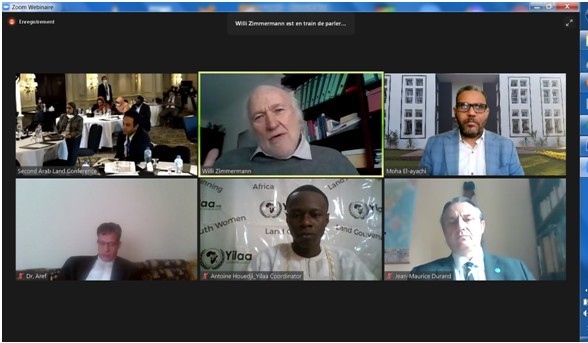
One of the main recommendations taken away from the Masterclass was strengthening academia’s role in coordinating actions between Private and Public partners. Encouraging the integration of new educational paradigms in training and research/smart tools on land governance was also emphasized. It was similarly mentioned that promoting youth/women initiatives for research actions on land governance, especially land right access, is crucial for the way forward. Reinforcing mastering strategies for good spatial and urban development was another point that was raised.
NELGA finally indicated that it offers advice in curricula development to universities and research institutions. It supports research by networking with Arab teams such as the Univerity of Lebanon and the introduction of its Master’s Program in Land Management. It also shares knowledge by publishing findings and research results through the African Journal on Land Policy and Geospatial Science.
Click here to read the Executive Summary of the Scoping Study
Find Presentations from the Masterclass below:
- Building a partnership for collaboration and capacity Development ft case study from Lebanese University by Prof. Jean Doumit
- Capacity Building on Land Governance and Land Tenure Using Geoinformatics Techniques by Prof Eltiab Saeed Ganawa
- Capacity Development Analysis in Egypt by Prof. Dr. Heba Allah Khalil
- Capacity Development Reflection by Prof Moha El-Ayachi
- De la gouvernance à la géogouvernance fonciére en Tunisie Dr Salwa Saidi
- Enhancing Land Development and Management by Prof Ousmane Wague
- Masterclass Common Strategy for Strengthening Capacity Development in The Arab Region
- Masterclass on Capacity Development in the Arab Region and The role of NELGA North Africa hub
- Methodological Framework for Conducting Scoping Studies in North Africa by Dr Nabila Zouhiri and Dr. Siraj Sait
Appel à Candidats et Bourses d’études – Master ‘Gouvernance Foncière et Gestion des Territoires’
Dans le cadre de l’initiative NELGA, l’UFR des Sciences Juridiques et Politiques de l’Université Gaston Berger de Saint Louis a récemment établi le master « Gouvernance foncière et Gestion des territoires ». Le Master est ouvert aux étudiants ou professionnels titulaires d’une licence (ou tout autre diplôme admis en équivalence) voulant se spécialiser dans les domaines de la gouvernance foncière. Sur critère d’excellence, les frais de scolarité seront pris en charge sous forme d’une subvention pour les meilleurs dossiers.
 Les étudiants/professionnels désireux de prendre part à cette formation sont priés de suivre les instructions sur le lien suivant
(English)
As part of the NELGA initiative, the Faculty of Legal and Political Sciences of Gaston Berger University in Saint Louis recently established the master’s degree in “Land governance and land management”. The Master is open to students or professionals holding a license (or any other diploma admitted in equivalence) wishing to specialize in the fields of land governance. The tuition fees will be covered for the best students.
Students / professionals wishing to take part in this training are requested to follow the instructions on the following link
